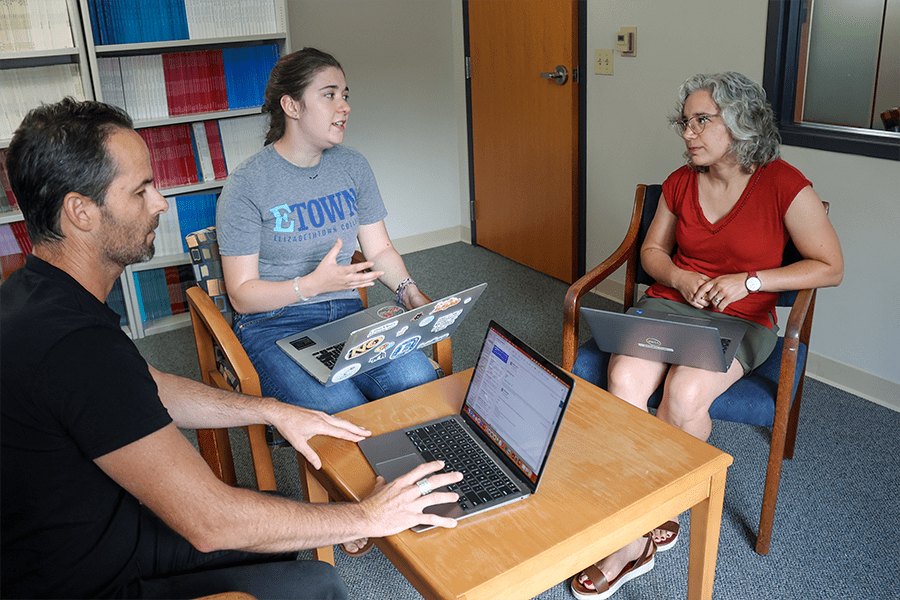Given a current, unprecedented epidemic of mental health struggles for many emerging adults between the ages of 18 to 25, Elizabethtown College Psychology major Sara Colletti ’25 is conducting research through the Summer Creative Arts and Research Program (SCARP) to better understand this population’s attitudes and beliefs in hopes of shedding light on potential barriers to effective treatments.
Colletti is working closely with faculty mentors Professor of Psychology Jean Pretz and Lecturer in Counseling Psychology Mike Shook to conduct the survey, collect data through social media, and connect with the local community. This project is part of the Honors Discipline research that she will be conducting throughout the fall. Colletti is continuing to seek interested participants for the survey.
Title of Research
Access and Attitudes: How These Variables Impact Emerging Adults Mental Health Treatment
Student Researcher
Sara Colletti ’25 (Psychology major)
Faculty Mentors
Jean Pretz, Professor of Psychology
Mike Shook, Lecturer in Counseling Psychology
What are you researching?
Colletti: Current emerging adults have more recorded mental health problems than previous generations, and a sizable portion of this population is not receiving quality mental health care. An individual’s perception of stigma and their barriers to access are correlated with their willingness to seek out services. I decided to see if there is a correlation between access, attitudes, and the likelihood that one has sought out treatment or desires to seek treatment.
Why did you choose this topic?
Colletti: I chose this topic as I have noticed many peers struggle with their mental health without seeking out the help that they need. Personally, lack of access, along with the presence of societal stigma toward individuals with mental health issues has also been something that I have wanted to learn more about to learn how to fix these issues. This research is a step in the right direction to address these issues.
What was the most interesting aspect of this research?
Colletti: Being able to learn more in-depth about topics that interest me as I often do not have time during the semester to be able to do a complete deep dive into the topics that I am most passionate about due to the amount of coursework along with other responsibilities. It is cool to focus on one specific thing that interests me.
What are you hoping to accomplish through this research?
Colletti: I would like to be able to take this research to help inform future policies and create interventions with mental health care providers to assist with encouraging individuals to seek out treatment. I think it is important to understand the why behind the lack of treatment-seeking that we are seeing in emerging adults and to also inform others of how they can assist this population.
Talk about working with your mentor. How have they helped you throughout this experience?
Colletti: My mentors have greatly assisted me in working to bring this project from an interest of mine to a fully fleshed-out research endeavor. Dr. Pretz is well-seasoned in conducting research and helps me to edit and focus on specific topics within my project, troubleshooting technical issues with my survey and its dissemination, and helping me collect and interpret data. Professor Shook helps connect me to others in the community to assist with collecting data and reaching more participants, has been helping to inform me of the struggles with the mental health care system from the practitioner’s point of view, and working to help me to brainstorm next step of what I can do with the interpreted data to help improve the ways we address mental health treatment.
Hear from the faculty mentors — Jean Pretz and Mike Shook
“I am so grateful for the SCARP program,” Pretz said. “It provides invaluable training and experience for our students which gives them an advantage in any graduate work they may pursue after Etown. I especially enjoy working with students one-on-one and sharing my love of research. The research process is never easy, and there are a lot of ups and downs throughout the experience, but it is always so exciting when you finally crunch the numbers and make sense of the results. I love that moment when you realize you’re the first to know about the discovery you have made. That is a really special experience to share with a student.”
“Sara is a deeply thoughtful and passionate up-and-coming researcher,” Shook said. “This project has emerged out of her own experience and a desire to better understand the help-seeking patterns and attitudes of young folks in our community.”

